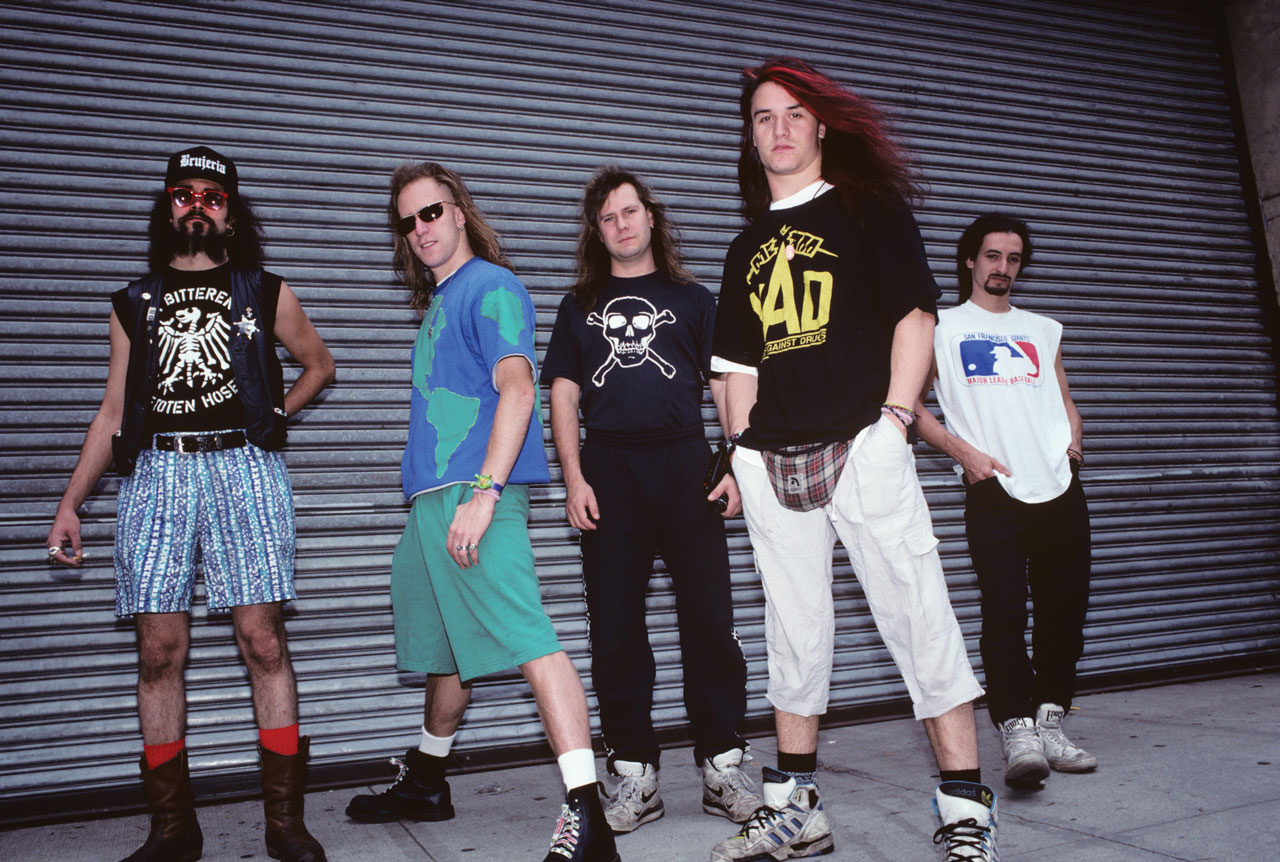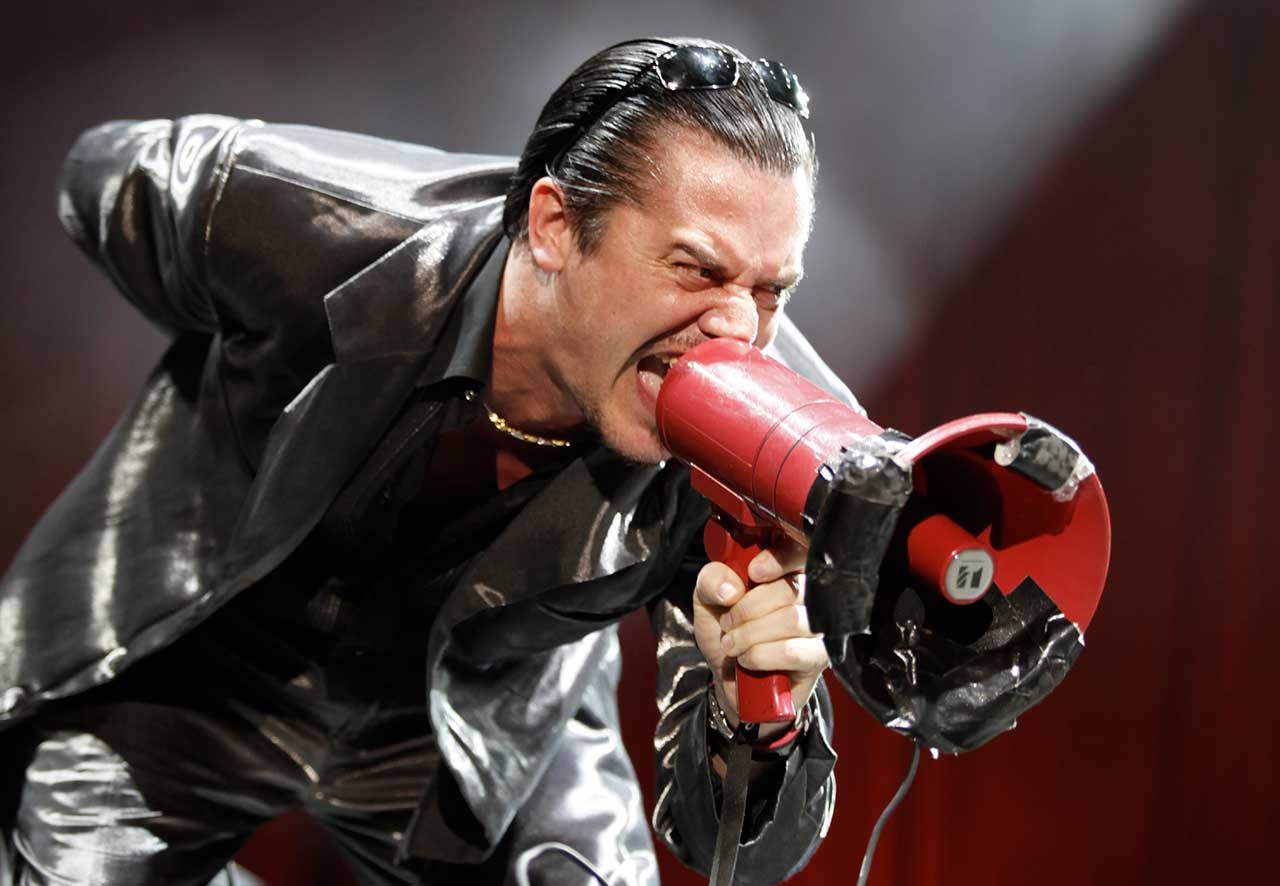“Every record is its own universe; we don’t think about whether or not it fits into the grand scheme of things." Mike Patton's world of art rock
No one's really suggesting Mike Patton's a cape-wearing prog rocker. But he admits that with some of his musical ventures, he does come close...

Select the newsletters you’d like to receive. Then, add your email to sign up.
You are now subscribed
Your newsletter sign-up was successful
Want to add more newsletters?

Every Friday
Louder
Louder’s weekly newsletter is jam-packed with the team’s personal highlights from the last seven days, including features, breaking news, reviews and tons of juicy exclusives from the world of alternative music.

Every Friday
Classic Rock
The Classic Rock newsletter is an essential read for the discerning rock fan. Every week we bring you the news, reviews and the very best features and interviews from our extensive archive. Written by rock fans for rock fans.

Every Friday
Metal Hammer
For the last four decades Metal Hammer has been the world’s greatest metal magazine. Created by metalheads for metalheads, ‘Hammer takes you behind the scenes, closer to the action, and nearer to the bands that you love the most.

Every Friday
Prog
The Prog newsletter brings you the very best of Prog Magazine and our website, every Friday. We'll deliver you the very latest news from the Prog universe, informative features and archive material from Prog’s impressive vault.
Mike Patton is one of the most technically gifted, versatile and influential vocalists of the past two decades. It’s a bold statement but if you look at the number of different projects the Californian has worked on over his career as well as the bands he’s influenced and critical acclaim he’s amassed, it’s not really a stretch.
Enjoying huge success during his decade as singer with Faith No More, they were seen as an alternative to fellow Californian funk metallers, Red Hot Chili Peppers. Following the release of The Real Thing in 1989 – which went platinum in the US – a feud erupted when RHCP frontman Anthony Kiedis accused Patton of stealing his style.
Now, over 20 years later we see that it’s Patton who is truly inimitable and innovative. When he was busy cracking charts with his new band all over the world, his passionate, dynamic voice and distinctive, cartoonish features left a mark on his fans. These were fans that would go on to follow his work in whichever direction it took them. He never demanded their loyalty, just got given it. His anti-hero behaviour courted the alternative populace and by never dancing with the devil that is mainstream radio rock, he kept them. If that’s not the mark of a maverick then a re-definition is required.

Patton was performing plenty of shows – often in un-nerving costumes – with his high school band Mr. Bungle when he joined Faith No More but had only released a handful of demos at the time. The Guardian described them as a “novelty death metal band Patton and his friends amused themselves with,” but they became much more. The two bands were not mutually exclusive and Patton released an eponymous debut with Mr. Bungle in 1991, in which samples from David Lynch’s Blue Velvet can be found throughout. This was the most overt insight in Patton’s film influences to be found in Mr. Bungle. Disco Volante (1995) is a direct reference to a boat in James Bond film, Thunderball. The band’s third and final album, California (1999) settles for simply being heavily influenced musically by soundtrack music.
“When we started writing for this record, it became apparent that we were all writing in song form more than we ever had, and we said, ‘Hey, it would be fun to do a record of songs.’ As opposed to operettas or jazz improvs or, you know, noise pieces – whatever the hell you want to call them,” Patton told The Onion.
“Every record is its own universe; we don’t think about whether or not it fits into the grand scheme of what Mr. Bungle is,” he continued in the interview. “Each record is its own little world and you use special tools to get those things.”
Patton often drew comparison to Frank Zappa despite only taking charge of vocal duties, samples or keyboards and never really being a fan. The genre-bending inaccessibility of their debut and the diversity (or obscurity) of the incredibly heavy follow-up continued to be questioned until their final album, California, which was as close to having standard songs as they got. Mr. Bungle did not make background music and the only thing that united the jarring incongruity of their music was film.
Sign up below to get the latest from Prog, plus exclusive special offers, direct to your inbox!

The next project that Patton took on was Fantômas – a supergroup of sorts, featuring Buzz Osbourne of Melvins, Trevor Dunn of Mr. Bungle and Slayer’s Dave Lombardo. Their M.O. was to build albums around specific themes – the more bizarre the better.
With the 1999 self-titled debut taking inspiration from Italian comic books, 2001’s The Director’s Cut was a collection of re-worked film theme tunes with varying levels of recognisability before Delìrium Còrdia took on the concept of surgery without anaesthesia in 2004. The following year, Fantômas released the 30-track Suspended Animation which focused on the minor holidays found in the month of April.
In December 2008, Mike Patton curated an All Tomorrow’s Parties event where Fantômas performed The Director’s Cut in its entirety, again bringing his love for the motion picture into focus.
What’s certain about every single one of the 80-plus albums Patton has appeared on in some guise is that Mike Patton is the central character, influence and songwriter on it. What has also been clear from the very start is that above all else, he is a vocalist that is prepared to push every boundary. His 1996 solo debut, Adult Themes For Voice, is a 34-track exercise in making life difficult for the listener. There are no songs per se – just a long and varied stream of freeform noises emitted from Patton’s throat. ‘Avant-garde’ and ‘experimental’ just don’t cover it.
“In the 60s, there was the Fluxus Movement,” he says of his inspiration in
a recent interview with Movieweb. “There were a lot of sound poets at the time. I took inspiration from them in doing that record. It was pre-verbal language… a lot of grunts and sounds.”
Tomahawk was almost a straightforward band compared to the complexities of
Mr. Bungle and Fantômas but nothing concerning Mike Patton can ever really be anything approaching ‘normal’. The band – completed by Jesus Lizard guitarist Duane Denison and ex-Helmet drummer John Stanier – took to wearing police uniforms while performing; all part of the effort to disorientate and make the spectacle. Patton’s bands never pour a half measure live, but ultimately it’s all about the records.

Take 2006’s Peeping Tom, for instance. The multi-collaborative hip-hop/experimental rock fusion project began life in the studio with notorious pop producer Dan The Automator, Bristol experiment trip-hop heavyweights Massive Attack and American beatbox virtuoso, Rahzel. With a different name on each of the 11 tracks, the primary aim was to create an excellent album. Mission accomplished. Performing those songs live would be a logistical nightmare involving well over a dozen people but a pared down version still hit the road backed by New York dub/rock crossover band, Dub Trio and Rahzel.
It’s been well documented that there are at least two more albums worth of material written for Peeping Tom – intended to be a trilogy and yet again named after a film – but it’s all currently waiting to be finished.
“It’s sort of dormant right now,” he explains to Prog. “I need to streamline it and find a real path for the next record because I don’t want to follow the same formula I did for the first one.”
Dan The Automator is a persistent but seemingly difficult collaborator as he features on a whole load of Patton projects including the down-tempo trip-hop combo, Lovage, from 2001, which is ongoing, and Crudo, which, like Peeping Tom, appears to be at something of a crossroads. There’s a sense of exasperation as Patton talks about unfinished projects that are clearly out of his control.
“I think that not everything you’ve recorded has to see the light of day,” he says with slight resignation. “I’m proud of the music but maybe it’s just not meant to be.”
Completely different to Patton fronting a band, collaborating with others or releasing a solo album is the music that is closest to his heart – film music. This year has seen the release of Mike Patton’s third film soundtrack, a dark, delicate affair that’s far removed from either the disparate, obnoxious experimental metal of his work in bands or the soulful hip-hop work with Dan The Automator. When Mike Patton works on a movie soundtrack he has to take himself out of the equation and immerse himself in being inspired by others’ work.

“What I’ve found is the trick to doing any film score – and hopefully I’m getting a little bit better at it – is taking a back seat and realising you’re one small fragment of this gigantic mechanism and the music cannot be screaming, ‘Look at me! Look at me!’” Patton explains. “It’s definitely a challenge because the music that I grew up with is all about yelling and screaming and drawing attention to itself.”
“For this, basically, my band is the movie or the book so I’m not writing for a specific person or player with specific tendencies or abilities. I’m writing it all myself,” Patton says. “For a movie like this, I don’t think that collaborating was an option. I needed to be alone and do it by myself.”
The movie in question is The Solitude Of Prime Numbers, based on an Italian novel from 2008. The tale follows the lives of two people from their youth into young adulthood and the traumas they suffer. The idea is that the characters are like twin primes – prime numbers separated by a single even number. They are forever close but never quite touching. It’s a sad theory and one that Patton’s stark, atmospheric soundtrack reflects perfectly.
“It was mostly just organic instruments,” he says of the album, speaking from his San Francisco studio. “What I was trying to do was give traditional instruments centre stage. I really wanted the melody to be singular and the narrative to be melodic. The Solitude Of Prime Numbers is a lonely affair and I just wanted to create a desolate and melancholy atmosphere.”
This isn’t Patton’s first dalliance with Italian culture. He is fluent in the language after being married to an Italian artist for seven years and owning a home in Bologna until 2001. In 2010 he released Mondo Cane (A Dog’s World), an orchestral album of cover versions of Italian pop songs from the 50s and 60s, including a couple by Italian composer, Ennio Morricone – famous for his soundtrack work on Spaghetti Westerns such as A Fistful of Dollars. Knowing all this, it seems less obscure for Patton to soundtrack the adaptation of an Italian best-seller.
His work on The Solitude Of Prime Numbers is about as far removed as you can get compared to his previous soundtrack, Crank 2: High Voltage – a Hollywood blockbuster action movie from 2009 set at breakneck speed. The collection of 32 skits reflects the high-octane nature of the film by containing harsh noises and never lingering on one moment for too long.
“With Crank 2 there wasn’t really a lot of room for melody,” Patton laughs. “It was more about sound and stark contrast. The visual style of the movie was very jarring and was very hyper-edited and stylised. I wanted the soundtrack to reflect that.”
If anything, the inorganic experimental sounds which made up Crank 2 married the style of his earlier spasmodic rock and his love for movie soundtracks perfectly. It’s the new album that marks Patton out as a true maverick. Acknowledging his refusal to stand still creatively as well as the reception of his work critically and commercially, there is absolutely no question that Mike Patton is one of the most progressive musicians of his generation. His reaction to the suggestion is as amusing as it is thoughtful.
“I’ve been called lots of dirty names before. Prog? I’ve heard worse,” Patton laughs. “I don’t really consider myself part of any genre and I think that’s the healthiest way to look at it as an artist. I think that anything that I do is a little bit bastardised and a bit of a freakish hybrid and if people want to call it one thing or another, it doesn’t bother me in the least as long as they’re interested.”
As long as Patton keeps innovating and evolving, there’s little chance of people tuning out any time soon.
This article originally appeared in issue 22 of Prog Magazine.
